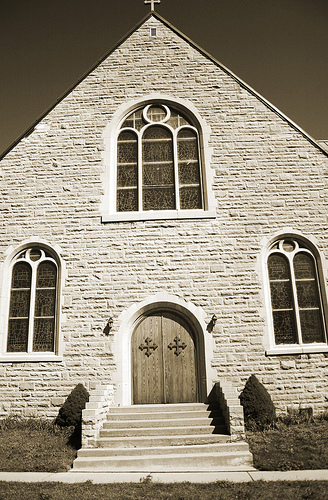 There are two passages that stand out in Romans as being tricky for preachers. These are the two passages that other ministers laughed about when they heard I was preaching through Romans. Everyone wanted to know how I would handle chapter 9, which deals with predestination and election, and chapter 16, in which Paul greets a bunch of people. Chapter 9 was dangerous because it could have ignited a firestorm of controversy. Chapter 16 is dangerous because it could ignite a firestorm of boredom.
There are two passages that stand out in Romans as being tricky for preachers. These are the two passages that other ministers laughed about when they heard I was preaching through Romans. Everyone wanted to know how I would handle chapter 9, which deals with predestination and election, and chapter 16, in which Paul greets a bunch of people. Chapter 9 was dangerous because it could have ignited a firestorm of controversy. Chapter 16 is dangerous because it could ignite a firestorm of boredom.
At first glance, this is almost like reading the recipient list on a mass email. And yet, we know that all Scripture is God breathed and profitable for instruction, correction and training in righteousness.
Romans 16 is profitable, especially for our understanding of the church. In these precious verses we see that the church is personal, the church is practical and rooted in Christ.
Church is Personal
Paul mentions about 35 people by name in these two passages. When Paul was writing this letter, he was not writing to an impersonal organization . He was writing to Prisca and Aquila and those who met in their house. When Paul prayed for the Roman Church he was not praying for some vague enterprise. He was praying for Junia and Ampliatus and Urbanus. When Paul thought about the Roman Church he was thinking about Epaenetus and Mary and Andronicus. This passage shows that he is writing to people because his Holy Spirit inspired understanding of the church was that it is personal in nature. That is, it exists in the form of people. The same is true of the church today across the globe. The same is true of the church in America. The same is true of the church that gets together under the name Dulin’s Grove. Though the rest of this sermon will focus on Dulin’s Grove, it applies to the universal church and all the local churches that cluster around the world.
 Church is personal—not geographical, theatrical or institutional. If Dulin’s Grove is driven from this building and plot of land, do we still exist? Yes! If the show ends, and we no longer have a platform, sound system, hymn books, PowerPoint, piano or organ; do we still exist? Yes! If the name Dulin’s Grove becomes banned and our founding papers burned, do we still exist? Yes!
Church is personal—not geographical, theatrical or institutional. If Dulin’s Grove is driven from this building and plot of land, do we still exist? Yes! If the show ends, and we no longer have a platform, sound system, hymn books, PowerPoint, piano or organ; do we still exist? Yes! If the name Dulin’s Grove becomes banned and our founding papers burned, do we still exist? Yes!
The fact that the church is personal has massive implications. I’ll mention four:
Since the church is personal, the character of the people forms the character of the church. The church is what the people are. If the people are humble, the church is humble. If the people are proud, the church is proud. If the people are prayerful, the church is prayerful. If the people are self-reliant, the church is self-reliant.
Since the church is personal, the actions of the people form the actions of the church. Forrest Gump taught the world that “stupid is as stupid does.” Well, the church is what the people do. The only way for Dulin’s Grove to worship God is for the people to worship God. The only way for Dulin’s Grove to love neighbors is for the people to love their neighbors. The only way for Dulin’s Grove to make disciples is for the people to make disciples.
 We’ve all heard (and said), “I wish the church would ______.” Often when we say these things we have in mind the church as an impersonal institution, a machine that can be programmed to the preferences and whims of its owners. This is not how it works. For the church to _____, the people of the church must _______.
We’ve all heard (and said), “I wish the church would ______.” Often when we say these things we have in mind the church as an impersonal institution, a machine that can be programmed to the preferences and whims of its owners. This is not how it works. For the church to _____, the people of the church must _______.
Since the church is personal, to get involved with the church is to get involved with the people. There is no way to be connected to a church without being connected in real relationships with the people. When you think you’d like to get more involved with church, I urge to you consider getting more involved with the people and not mere activities.
God has been prompting me to study the spiritual gifts lately, so that is what we discussed at the Big Gathering Wednesday. Along with each of the gifts, I brainstormed some recommendations for how to move forward with each gift. And without intention on my part, each and every gift, from prophecy to pastoring and everything between, included the following recommendation: Get involved with people. That’s because as I’ve been studying these gifts I’ve realized that they all require relationships with people among the church to function.
Since the church is personal, in order to build the church up we must build the people up. If it doesn’t build the people, it doesn’t build the church. Build the children. Build the teens. Build the young adults. Build the old adults (JK!). And thereby build the church.
One lesson we learn from Paul’s greetings is that the church is personal. Who are you? What do you do? Because that’s who Dulin’s Grove is and what Dulin’s Grove does.
Church is Practical
What I mean here is that the church is real people doing real things in real life for a real purpose. Look at what these people were up to:
- Phoebe seems to have been wealthy. She used her wealth as a part of the church to support many Christian ministers, including Paul. She also used her wealth to travel from Corinth to Rome, most likely carrying this letter!
- Prisca and Aquila risked their necks for Paul, joining him in prison. They hosted a house church in their home. From Acts we know that they also mentored a gifted young teacher named Apollos who ended up being instrumental in the Corinthian church.
- Mary, Tryphaena and Tryphosa (who may have been twin sisters) and Persis are all said to have worked hard, labored and toiled until weary. We don’t know what form their work took. Urbanus and Timothy are called a fellow workers, which seems to denote more of an assistant sort of role. Rufus’ mother assumed a maternal role in Paul’s life. Tertius wrote this letter as Paul dictated it. Gaius hosted Paul and many others in his home.
As you read these verses you observe ordinary Christians using the resources and gifts at their disposal, working together to move the gospel forward. Some earned money and gave. Some assisted others. Some hosted church gatherings in their homes. This is what the body of Christ looks like. As Paul says in 1 Corinthians 12:12, “For just as the body is one and has many members, and all the members of the body, though many, are one body, so it is with Christ.”
The church isn’t merely theoretical or doctrinal. It is the sum of people of God + the enabling gifts of God + the mission of God, which is to make Christian disciples of all nations.
This may seem obvious, but I think we tend to forget it. And in our forgetfulness, we get absorbed into propping up a church structure, like those old false-front buildings you see in westerns. “We gotta keep attendance up!” “We gotta keep children’s stuff up!” “We gotta keep excitement up!” We were never called to prop up attendance, programs or excitement. We were called to trust Jesus. We were called to follow Jesus. We were called to worship God. We were called to love our neighbors. We were called to make disciples. We were gifted to accomplish these things practically together. And accomplishing these things practically together is what the church does.
Listen to 1 Corinthians 12:4-7:
Now there are varieties of gifts, but the same Spirit; and there are varieties of service, but the same Lord; and there are varieties of activities, but it is the same God who empowers them all in everyone.
So here’s how it works: God saves people by sparking within them trust and allegiance to Jesus Christ as they hear the gospel. He gives these people the Holy Spirit who empowers them to become a functioning part of the church (both global and local). This empowerment includes specific gifts, unique to each new believer. These believers then grow and begin to use their gifts as a part of the church. What are these gifts? Here are the ones mentioned in Scripture, though I don’t think this list is exhaustive. See if you think any of these might be yours, or if anyone specific comes to mind as you hear them:
- Prophecy: The ability to speak God’s work forcefully and effectively.
- Service/Helping: The ability to assist others effectively in the background. It seems like Urbanus and Timothy may have had this gift.
- Teaching: The ability to explain God’s word clearly and effectively so that people learn and grow.
- Exhortation/Encouragement: The ability to speak to people in such a way as to move them forward in their walk with Christ.
- Contribution: The ability to make money and give it strategically to advance the gospel. Phoebe seemed to have this one.
- Leadership: The ability to lead others among the church in the right direction.
- Mercy: The ability to patiently love and sympathize with needy and pitiful people.
- Wisdom: The ability to use knowledge well, to make good decisions and give helpful advice.
- Knowledge: The ability to learn and organize facts and truths.
- Faith: The ability to trust God deeply.
- Healing: The ability to trust God deeply in reference to sickness and injury.
- Miracles: The ability to trust God deeply in reference to the impossible.
- Discernment: The ability to read people and situations accurately.
- Apostle: The ability to forge boldly ahead with the gospel message into new cultures and lands. Paul held this office and this gift.
- Administration: The ability to organize people and thus facilitate progress among the church.
- Tongues/Interpretation of Tongues: The ability to speak with God in a private prayer language, communicate with people of different languages than your own or understand these languages.
- Evangelism: The ability to effectively give the gospel to non-Christians.
- Shepherding/pastoring: The ability to effectively nurture Christians in the gospel. Timothy later became a pastor, so he must have had this gift.
Just as our bodies have vocal chords and mouths; the church as prophets, teachers and exhorters. Just as the body has arms, hands and fingers; the church has servants and contributors. Just as the body has a brain, the church has leaders, the knowledgeable, the wise and discerners.
The church has some who are especially merciful so it can reach out to those in need of mercy. The church has some who have especially deep faith so that it can be a prayer pipeline of divine power such as healing and miracles. The church has others who are especially able to go boldly into foreign lands with the gospel so that it can make disciples of foreign nations. The church has some who can administrate so that it all stays organized. The church has some who are especially able with non-Christians so that it can baptize new believers and others who are especially able with Christians so that it can teach those new believers all that Jesus taught. These are the practical matters of the kingdom for which we are each suited.
I’m reminded of this line from Hugo:
Everything has a purpose, clocks tell you the time, trains takes you to places. I’d imagine the whole world was one big machine. Machines never come with any extra parts, you know. They always come with the exact amount they need. So I figured if the entire world was one big machine… I couldn’t be an extra part. I had to be here for some reason. And that means you have to be here for some reason, too.
You’re not an extra part. I believe that God has equipped us as a local church with just the right people we need to fulfill our unique function in his global church. This raises two important questions:
- What part are you meant to play in the church?
- What part is our local church meant to play in the global church?
Think with me for a moment. What if each individual Christian has an absolutely unique role to play in God’s practical work in the world? And what if each local church, made up of its own unique combination of Christian individuals, has an absolutely unique role to play as well? This would mean that your role is different from everyone else’s and that Dulin’s Grove’s role is different from every other church.
 This would mean that there is no standard correct way to “do church”. This would mean that each local gathering could have a completely different format and function based on its unique DNA of church members. One church might meet on Sunday mornings at 11am. Another might meet on Monday evenings at 7pm. One might have Sunday school and then a traditional worship service. Another might meet for a brief word from Scripture and prayer, go out in pairs to share the gospel at the mall, return to share testimonies, then pray for those they encountered and worship in song (if I’m not mistaken, this is what Francis Chan’s church plant in California is doing). One might meet in a designated church building. Another might meet in a local park and share a picnic lunch afterward.
This would mean that there is no standard correct way to “do church”. This would mean that each local gathering could have a completely different format and function based on its unique DNA of church members. One church might meet on Sunday mornings at 11am. Another might meet on Monday evenings at 7pm. One might have Sunday school and then a traditional worship service. Another might meet for a brief word from Scripture and prayer, go out in pairs to share the gospel at the mall, return to share testimonies, then pray for those they encountered and worship in song (if I’m not mistaken, this is what Francis Chan’s church plant in California is doing). One might meet in a designated church building. Another might meet in a local park and share a picnic lunch afterward.
Continue to imagine with me. What if we suspended all our usual practices and came together on Sunday mornings to prayerfully pursue God’s direction for us as individuals and as a church in light of God’s open word, our gifts and our opportunities in this community? What if instead of recruiting volunteers for predesigned roles in predesigned programs we began to work hard as individuals to use our gifts toward the unique assignments placed before us by the Lord?
If we were to do all this, what sort of Dulin’s Grove would emerge? If our church was purely the outgrowth of the gospel’s work in us, what would it look like? What function would you serve? Would you find that your role is like Phoebe’s, to use your wealth and resources to facilitate the spread of the gospel, working hard, making money and investing it wisely toward this end? Would you find that your role is more like Prisca and Aquila, opening your home to facilitate Bible studies and fellowship, mentoring younger Christians? Would you find that your role is like Rufus’ mother, to come alongside younger generations in maternal love? Or would it be something altogether different?
We don’t have to shut everything down. But let’s discover our functions. Consider this an open invitation to call me so we can meet and pray through it together. Then we can each work hard accordingly on the practical tasks set before us: trusting Jesus, following Jesus, worshiping God, loving our neighbors and making disciples of Jesus Christ among all nations, beginning with those right beside us in our homes, neighborhoods and community.
The church is personal and practical. As important as all this is, the most important lesson is this last one: Christ is the point.
Lillian asked me recently how trees were able to stand up without ever falling over. I realized that she thought trees were just sitting there on the surface of the ground. So I explained roots to her. Roots are one of the most important parts of the tree. Here’s how a gardening website describes roots:
“Roots store nutrients for the plant during the winter and transport water and minerals during the active part of the growing season. Roots also provide an anchor to the plant, keeping it from toppling during extreme weather conditions.”
The church is like this. It does not just sit on the surface. There’s something deeper and vital to the church’s existence. The true church is rooted in Christ. This is where we get our nutrients and water and minerals so we can grow. This is our anchor that keeps us from toppling during extreme conditions. Note how the Roman Church is rooted in Jesus Christ:
– “that you may welcome her in the Lord.” (v.2)
– “my fellow workers in Christ Jesus” (v.3)
– “they were in Christ before me” (v.7)
– “my beloved in the Lord” (v.8)
– “my fellow worker in Christ” (v.9)
– “who is approved in Christ” (v.10)
– “those in the Lord” (v.11)
– “those workers in the Lord” (v.12)
– “worked hard in the Lord” (v.12)
– “chosen in the Lord” (v.13)
– “churches of Christ” (v.16)
Unfortunately we often, in a desire to stay upright and grow, will try to root down into sandy soil that holds no nutrients or stability. This is a form of idolatry. It can be gimmicks or programs. “If we just revamp ______, then we’ll be saved and secure.” “Suchandsuch Baptist Church is doing _____. If we do ______, then we’ll be saved and secure.” The key to a thriving and secure church is for the individuals who comprise the church to sink deep roots into Jesus Christ, trusting and following him ever more deeply. That is the place to start. That is the place to continue. That is the place to end.
Perhaps the most subtle and dangerous form of idolatry along these lines is church worship—people worshiping the church. You see it when people vigorously promote their church and not Jesus. You see it when people eagerly identify with their church but not Jesus. You see it when people invite needy people to their church and don’t speak to them about Jesus.
This subtle idolatry is especially damaging when people expect their church to provide things that only Jesus can provide: forgiveness and fulfillment. Christianity is coming to Jesus and being made complete and thereby becoming the church—not coming to church to be made complete. Church will not and cannot complete you. Only Jesus can. It is such a subtle shift, and a damning one.
Paul did not write:
– “that you may welcome her in the church.” (v.2)
– “my fellow workers in church” (v.3)
– “they were in the church before me” (v.7)
– “my beloved in the church” (v.8)
– “my fellow worker in church” (v.9)
– “who is approved in church” (v.10)
– “those in the church” (v.11)
– “those workers in the church” (v.12)
– “worked hard in the church” (v.12)
– “chosen in the church” (v.13)
– “churches of Church[!]” (v.16)
We will not be a church of Church! We will be a church rooted in Jesus Christ. We will be a church of individuals, men and women, boys and girls, trusting ever more deeply in Jesus for all our needs and following him ever more joyfully—reading what he has said and responding in obedience in the practical tasks of the kingdom.
Conclusion
I want each of us to thrive as individual members of the church and for Dulin’s Grove to thrive as a local church.
Maybe this is an invitation for you to take your focus off the impersonal effects of the church and focus on loving the people. Maybe you need to repent of worshiping the church rather than God, trusting the church rather than Jesus. Maybe you’ve never truly gone to Jesus, asked for forgiveness of your sins and given your life to him in faith. If that describes you, do it now. Maybe you’re a Christian whose roots have stretched away from Jesus lately, looking for nutrients and security elsewhere. Stretch back to him. Find some quiet time with the word and prayerfully do so today. Maybe you are a Christian but are not engaged as a member of the church. Maybe you are a Christian who is engaged in practical church work that you’re just not meant for—a servant trying to lead or a leader trying to serve perhaps. Maybe you’re a Christian, rooted in Jesus and engaged in practical kingdom work that fits you like a glove. To you I say rejoice and work hard!
Discussion Starters
- Read this passage together and have each member of the group select one individual who stands out to them as particularly interesting, then share your selections.
- How would you describe Dulin’s Grove to an outsider? How would you describe the universal church (all Christians throughout history and across the globe)?
- What difference does it make to think of the church as personal, made up of people? What other ways do we sometimes think of church?
- Assign different people in the group to read Romans 12:3-7; 1 Corinthians 21; and Ephesians 4:1-16 aloud. Discuss together what spiritual gifts you each might have. Which ones do you think you might have? Which ones do you think other people in the group might have? How might these gifts be used as parts of Dulin’s Grove?
- If we did away with all our traditional practices and did only what our people are gifted and have the opportunity to do as the body of Christ, what might our church look like? What sorts of ministries would we do as individuals and as a church body?
- Work together to find all the times that Paul mentions Jesus, Christ or the Lord in these verses. Do you think that we are this rooted in Jesus as a church? Why or why not? How can we root more deeply into Christ? What other things do we try to sink our roots into?
- Take some time to pray for our church (which means the people!).







